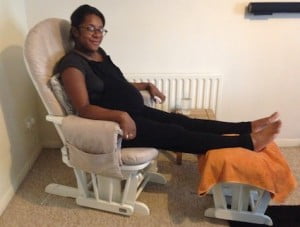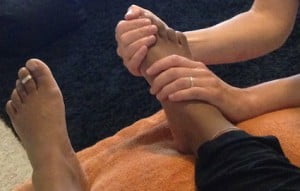What is Reflexology?
Reflexology is an ancient art that has been practiced worldwide for over 5000 years. The idea of a “reflex” is it is an area of the body that mirrors or reflects another part. The feet (and also the hands and ears) represent the entire body and so by working on specific areas of the feet, we can “read” areas of the body that might be stressed, and by working on those areas, often in conjunction with areas that correspond to other parts of a bodily system (the reproductive system, for example), we can help to ease the stress in that part of the body and help the body to work better.

Credit: https://www.littleepiphany.com/massage/foot-massage-chart.htm
Studies have shown that reflexology aids relaxation, improves wellbeing and mood and aids sleep. This may not sound like much but stress can have a massive impact on our lives and helping to reduce it can have a very positive knock-on effect to the entire body.
Well-being may sound a bit wishy-washy but we are talking about your state of mind here, your relationship with your mind and your body which helps to frame your relationships, your happiness and, to some extent, your health.
What is special about pregnancy reflexology?
Pregnancy reflexology (and its pre-cursor, fertility or conception reflexology) is just one aspect of reflexology. The sequences used and the points on the feet that are worked on are reflective of areas in the body that relate specifically to pregnancy. Each session will be tailored to suit your needs based on the symptoms and stresses that your body is suffering. For example, if you had terrible morning sickness, the reflexology treatment would include working on points related to your digestive system.
Reflexology in pregnancy aims to work on both the physical and emotional aspects of pregnancy and your journey into parenthood, and so reflexologists will sometimes offer lifestyle and self-help advice and support.
Apart from anything else it gives you some special time away from your busy life, in a safe and soothing environment, where you can sit back, relax and experiences the comfort and relaxation of physical and nurturing touch.
Will reflexology benefit me?
Reflexology is not a medical diagnostic practice, and neither is it just a foot massage but somewhere in between. Reflexologists do not diagnose but will read the feet and try to get a sense of what is happening in the whole person. We do not offer cures or guarantees, but taking time to listen to your body and react to its cues, and helping it to reduce the stress hormones can lead to amazing benefits such as enhanced mood and wellbeing and improved sleep.
As reflexology treatments are completely individualised, it is impossible to say how you might react, other that to find it relaxing. The only way you can find out is to give it a go!
What happens in a treatment?
 In your first treatment you will be asked a series of questions on your health and lifestyle in order to gauge which points should be worked on during the sessions. You will also be asked to sign a consent form. (All information is confidential.)
In your first treatment you will be asked a series of questions on your health and lifestyle in order to gauge which points should be worked on during the sessions. You will also be asked to sign a consent form. (All information is confidential.)
After removing your shoes and socks, you will be seated or lying down (although in later pregnancy, sitting is usually most comfortable), and your feet will be gently cleaned.
During the treatment the reflexologist will use thumbs, fingers and knuckles to apply pressure to the feet and lower legs, depending on the type of points being worked on.
The pressure can be as hard or soft as you like. It is not usually ticklish as firm and slow movements are made. Your feedback is paramount to ensure your maximum comfort level.
Treatments usually last an hour. you can often feel deeply relaxed after a treatment. Occasionally you may need to go to the toilet or feel tired. this is a normal reaction and should pass quickly.
When can I have reflexology in pregnancy?
You can have reflexology throughout pregnancy. Different areas will be worked on in different trimesters, such as de-stress and digestive in first trimester, and physical aches and pains in second and third trimesters.
Although there is no evidence that reflexology can induce labour, reflexology can help support the body in preparation for labour through reducing stress and promoting relaxation when anxiety levels are often very high, which in itself can inhibit the onset of labour.
There have been recent studies that have shown that reflexology in pregnancy significantly reduced pain in labour, reduced the length of the first stage of labour, and improved quality of sleep postnatally.
To find out more about Birthzang’s Pregnancy Reflexology and to book a session to go Pregnancy Reflexology.
References
https://www.reflexology-uk.net/site/about-reflexology/reflexology-history
https://www.soothes.co.uk/USERIMAGES/reflexology_published_research.pdf
Randomised controlled trial of the effectiveness of using foot reflexology to improve quality of sleep amongst post partum women. Midwifery 27. P. 181-186


